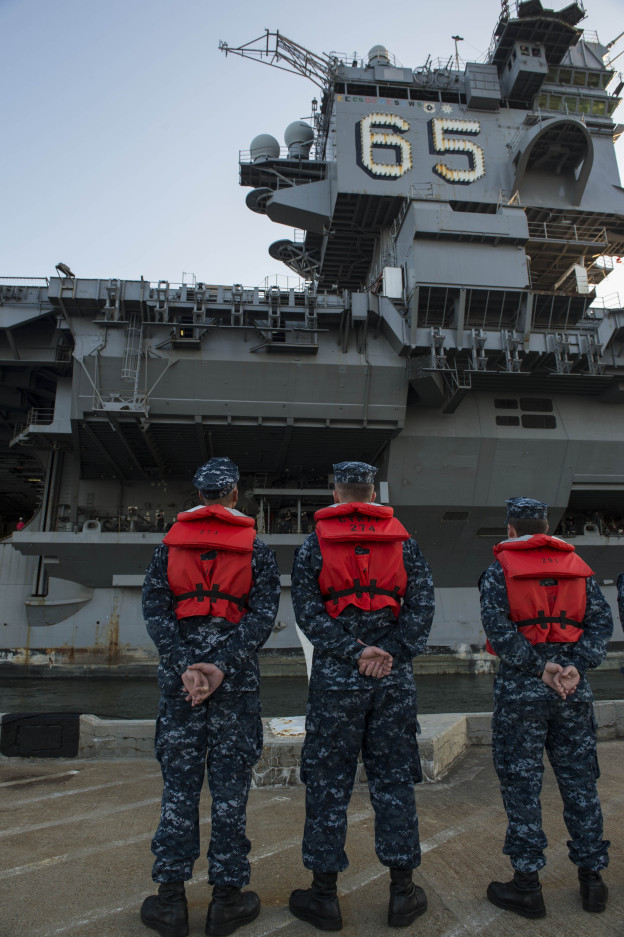
In September 1960, the carrier Enterprise was christened at Newport News Shipbuilding & Dry Dock. Adm. Arleigh Burke, then chief of naval operations, spoke to the large crowd, saying, “Whenever the Enterprise roams in the traditional freedom of the seas, she is the sovereign of the United States, a mighty symbol of our determination to preserve liberty and justice and a clear sign of our nation’s ability to do so.”
After completing over 50 years of service and 25 deployments in operations ranging from the Cuban Missile Crisis to Operation Iraqi Freedom, this symbol of our nation’s influence of sea power was inactivated last December.
As this nation confronts another budget cycle with the strong possibility of sequestration that will continue the steady decline of our Navy, it is important for our leadership to understand countries with great sea power will have a greater impact on world policy.
In 2009, when I commanded Combined Task Force 151 in the Gulf of Aden, I had the great pleasure to host the commander of the Chinese Task Force, Rear Adm. Du, for lunch on my flagship, the Boxer. This was an event that was only made possible by two commanders willing to work together to solve the problem of piracy in the Gulf of Aden.
For a maritime nation that has one of the largest merchant fleets and is home to the three largest shipping container companies in the world, it is no mystery why the Chinese navy is deployed to the Gulf of Aden. Since their arrival in 2008, they have escorted hundreds of vessels through this body of water that passes over $3 trillion of trade each year.
China is modernizing its naval forces, and just recently conducted takeoff and landing flight operations on its Liaoning aircraft carrier in the South China Sea. Conducting this type of flight operations is a major milestone that should keep Navy planners awake at night as the Chinese navy extends far beyond its coastal waters.
A case in point on how the influence of sea power has changed the course of events for maritime commerce is the success story of coalition operations in the fight against piracy in the Gulf of Aden. In 2009, there were over 150 attacks on merchant vessels in the pirate waters off the coast of Somalia. Of those vessels attacked, 46 were successfully pirated, costing the global economy billions of dollars in ransom payments and increased insurance premiums.
Even after the hijacking of supertanker Sirius Star in September 2008, which was carrying over 2 million barrels of crude oil at a value of $100 million, there was little resolve to attack the pirate facilities ashore. It was determined by the leading maritime powers of the world that the only way to stop the scourge of these buccaneers from Somalia was with naval power.
Since the arrival of over 25 coalition naval units from around the world that include task forces from the European Union, NATO and Combined Task Force 151, the number of attacks has dropped significantly and there has not been a successful hijacking in over a year.
In the coming months, our government will be faced with a major decision on how to move forward with another year of sequestration. The cuts are part of a 10-year process to slash $1.2 trillion in federal spending that was triggered by Congress’ failure to adopt a deficit-reduction plan.
This year alone across the government, we have seen major programs canceled or delayed. From cancellation of White House tours and Blue Angels shows, our nation has suffered in ways we have never seen even in the worst of times.
The greater parts of these cuts have been taken by the Defense Department. In 2013, the bill for defense was over $37 billion and the projected cut in 2014 is $52 billion.
Adm. Jonathan Greenert, chief of naval operations, said recently that unless Congress intercedes, he’s preparing for 2014 to be much like this year, with reductions in some military operations and ship construction and repairs, and the possibility of more civilian furloughs.
With these continued cuts, our Navy, Marine Corps and Coast Guard will not only be forced to curtail support for counter-piracy operations but those operations that require our presence to preserve the free flow of commerce on the high seas.
As history has recorded, our nation’s rich history has always depended on sea power.
From the authorization of the original six frigates to fight the Barbary pirates to the christening of the Enterprise, we must continue to fund a powerful maritime force as a “symbol of our determination to preserve liberty and justice” throughout the world.
This post originally ran on Sunday in the San Diego Union-Tribune in cooperation with the U.S. Naval Institute.





